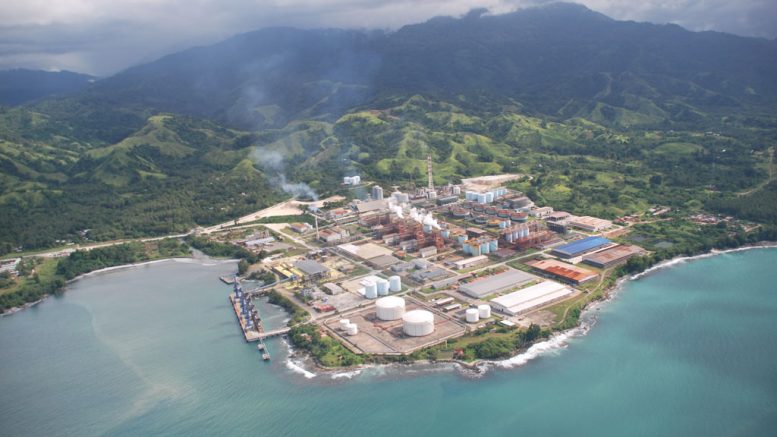Cobalt27 Capital (TSXV: KBLT) recently acquired a US$300-million cobalt stream on Vale’s (NYSE: VALE) Voisey’s Bay nickel-copper-cobalt mine, beginning in 2021. It also has a stream on the Ramu nickel-cobalt mine in Papua New Guinea owned by the Metallurgical Corp. of China, and a net smelter return royalty (NSR) on the construction-ready Dumont nickel-cobalt project owned by RNC Minerals (TSX: RNX) in Quebec. In total the company has 12 streams and royalties, as well as physical cobalt. In the last five months alone the company has increased its physical stock of cobalt by 800 tonnes to 3,000 tonnes. The Northern Miner recently spoke with Cobalt27’s chairman and CEO, Anthony Milewski, about the company’s investments and his outlook for nickel and cobalt in the emerging electric vehicle (EV) revolution.
The Northern Miner: You have just completed a $300-million equity raise to pay for the cobalt stream in your portfolio from Voisey’s Bay mine in Labrador.
Anthony Milewski: Vale’s Voisey’s Bay Mine is one of the best nickel-cobalt asset in the world, and so, as a company focused on cobalt and nickel, we felt it was important to participate and add value to our shareholders through streaming this orebody. Voisey’s Bay is considered “generational” as it represents the only new, significant nickel sulphide discovery in the last 30 years. You just have to look back at the interest it generated after being discovered, with both Inco and Falconbridge vying to acquire it. Vale, which acquired Voisey’s Bay in 2006, is the largest producer of nickel globally, and are significant producers of cobalt. The opportunity for Cobalt 27 to gain access to this asset through a 32.6% cobalt stream is really once in a lifetime, when you think about it. There may be two or three assets in this class globally. Although the current life-of-mine is stated at approximately 14 years, the Voisey’s Bay deposit is massive, and we believe that once Vale goes underground, further definition of the resource will take place to really understand what is possible in extending the life of the mine. This has been demonstrated in similar deposits of this nature, and there is the potential that Voisey’s Bay could produce nickel and cobalt for another 20 to 30 years. The fact that Cobalt 27 was able to secure this cobalt stream is significant to delivering on our pledge to generate shareholder returns.
TNM: That’s quite a big transaction for a company that has been around for just a year.

“China is at the moment a global leader in environmental policy around the automotive and transportation sector.”
Anthony Milewski
Chairman and CEO, Cobalt27
AM: It was a big year. We’ve built the company to a $733-million market capitalization in 12 months. We always knew that it would be a challenge to start a streaming and royalty company. If you look at a lot of the big streaming and royalty companies, they were founded on some form of spin-off, or other corporate transaction. We realized that was never going to happen for us, so, to begin, we went out and acquired the world’s largest commercial stockpile of physical cobalt. Having physical cobalt gave us a balance sheet, and once we had that, we could use the physical cobalt as part of our leverage to borrow money and complete streaming and royalty transactions. Since our initial public offering in June 2017, Cobalt 27 has raised equity and secured a revolving-credit facility, which we intend to increase, as we build our electric metals-focused investment portfolio. In addition to a portfolio of streams and royalties, we also have approximately 3,000 metric tonnes of cobalt sitting in London Market Exchange-bonded warehouses in the U.S. and Europe. We are building a cobalt-mining company with an excel spreadsheet, and not a shovel. We have physical cobalt, however, with the exception of one state-owned mine in Morocco, there really aren’t any other primary cobalt mines to invest in. About 98% or 99% of all cobalt comes as a by-product from copper and nickel production.
TNM: The Democratic Republic of the Congo (DRC) accounts for 60% of mined cobalt, and BMO estimates that will rise to 67% in 2025. But Cobalt 27 has sworn off doing any deals in the DRC for ethical reasons. (Apple calls DRC cobalt a “conflict mineral.”)
AM: One of our key tenets is that we don’t invest inside the DRC.
TNM: If the DRC produces so much of the world’s cobalt, doesn’t that mean battery makers will be under pressure to find substitutes for the cobalt in their batteries?
AM: Australia and Canada are two of the main regions where we expect to see increased mined cobalt production required to meet future demand. If you look at additional sources of cobalt outside the Congo, those regions are really taking off. You have Clean TeQ’s Sunrise project in Australia, RNC’s Dumont project in Quebec, which is moving towards construction, and now, Vale’s recently announced, US$1.7-billion expansion of Voisey’s Bay mine in Labrador, with production from underground operations scheduled to begin in 2021. What we’re really talking about is additional supply coming from nickel mines, with corresponding projected increases in nickel and cobalt prices over time.
TNM: We’re at an inflection point — the transportation industry is on the cusp of massive disruption.
AM: This is a big change and we are all just beginning to appreciate how fast it’s coming. We’re talking about a structural change in two of the major industries on earth: the energy industry and the automotive industry. It’s not very often that you have this type of disruptive change in two global industries. The automotive manufacturers are moving towards electric and quasi-electric vehicles. And then you have as much as 70% of crude used in the transportation sector. And, in the coming decades, a switch from fossil fuels into electric battery-powered vehicles ultimately weighs on the energy industry, and the accelerating adoption of the EVs, which includes rapidly increasing demand for electric metals used in lithium ion batteries. I believe we are talking about “peak oil” in terms of demand, and not supply.
That’s not happening tomorrow, these take five or 10 years to transpire. But you’re seeing a real disruption in important industries and as a result you’ll see changes in demand for basic materials. Not just cobalt, but for nickel, copper and lithium, as well.
TNM: But EVs still aren’t that cheap.
AM: The entry point for the latest Tesla sedan is about US$35,000. I’m not saying that’s not real money, or that you don’t have to earn that money, but there aren’t a lot of new cars that sell for less than US$35,000. EVs cost almost the same as conventional cars. In China you can buy an EV for about US$6,000.
TNM: What about some of the other barriers to adoption, like range anxiety and the availability of charging stations?
AM: When we look at disruptive technologies and the timeline for technology adoption, the first driver is price. Does the new technology cost about the same as whatever it is replacing? And for EVs, the answer is yes. The second driver of technology adoption is utility, and in the automotive sector there are two parts to that. The first is range — how far does a conventional car travel versus an EV — and the answer is that the new generation of EVs travel further than the majority of all commuter travel in a conventional car in a single day. The second aspect of utility in the case of EVs is rechargeability. I would encourage readers to go to Tesla’s website and look at all the recharging stations. They are everywhere now — even at hotels. The industry has moved through these barriers, which were real, and the acceleration of the adoption of EV technology is happening. We have now reached a tipping point. And the basic materials that comprise EVs are cobalt, copper, nickel and lithium, and for those metals we believe we are at the beginning of a five- to 10-year bull market.
TNM: How big is total cobalt demand today?
AM: The cobalt market today is approximately 110,000 metric tonnes, and a lot of that is driven by super-alloy industries — the airlines — and also batteries that have traditionally been used in mobile phones and laptops. What we have today is a new and rapidly growing source of demand, and depending on the penetration rate of EVs, could require as much as three times today’s mined cobalt production by 2025.
So when you introduce a brand-new source of demand it changes the dynamic. You had a market that was flat and now out of nowhere you have a huge source of demand, as people increasingly are buying EVs.
There are multiple points here. On the one hand, EVs are coming online, with prices comparable to conventional cars. Even in places like China, more so than in the West, people are becoming more socially conscious. People are being given the option to buy a car at the same price point, and there’s an increasing awareness of the environment and the destruction that fossil fuels are causing the earth. That’s real.
TNM: Would you agree that China is at the forefront of the EV movement? It subsidizes the EV market and has set a target that would see zero-emission vehicles make up 10% of all new sales by 2019, and 12% of all new sales by 2020. There are 172 car companies in China, among them the world’s largest EV company, BYD Auto Co. in Xi’an, Shaanxi province. (Berkshire Hathaway owns 8.25% of BYD Auto, which stands for “Build Your Dreams”). According to BMO, China has 40% of the world’s EV car stock and 30% of global sales overall. Last year there were over 600,000 units of battery electric and plug-in hybrid EVs — up 71% from 2016.
AM: China is at the moment a global leader in environmental policy around the automotive and transportation sector. In the West we’re lagging behind. China is targeting 25% penetration of EVs in 2025. It’s clear the government has looked at ways to clean up the air, particularly in large urban areas, and they’ve determined the most cost-effective and fastest way is through EVs. It’s an important moment in the world.
The U.S. has guided global policy since World War II, and now you’ve got China sticking its hand up and becoming a world leader on one of the most important issues of our time, the environment. What China is spending on EVs, in terms of manufacturing, research and development and infrastructure, will far outweigh what everyone else is spending.
TNM: Pollution from transportation is responsible for 25–30% of global greenhouse gas emissions. Is reducing emissions a reason you decided to jump into the cobalt business?
AM: Cobalt 27 is contributing by helping to fund the production and development of mined cobalt outside of the Congo. Through the acquisition of streaming and royalties on current and future production, we are helping to fund sustainable mines that produce cobalt and nickel that will help drive EVs. By creating this company, we’re helping to finance nickel and cobalt mines that ultimately power a cleaner future. And we’re avoiding the Congo, which is one of the other ways we’re contributing.
TNM: There are two major types of lithium-ion batteries: nickel-manganese-cobalt (NMC) and nickel-cobalt-aluminum (NCA). Are you concerned about changing battery chemistries and cobalt thrifting, or the emergence of a new battery technology that doesn’t require cobalt at all?
AM: We’re going to be using nickel-manganese-cobalt chemistry for a long time. Tesla uses NCA batteries and the balance of the world uses NMC batteries. The overwhelming majority of investment dollars, perhaps as much as 95%, are being spent on developing NMC batteries, so we believe NMC battery chemistry is going to be around for at least the next decade.
However, the chemistry within the NMC will evolve over time. The conventional wisdom today is that the battery chemistry that has the best stability, longevity, and re-chargeability is the 6-2-2 (six parts nickel, two parts manganese and 2 parts cobalt). We are at a 5-2-3 (five parts nickel, two parts manganese and 3 parts cobalt) today, and the generation after the 6-2-2 is the 8-1-1 (8 parts nickel, 1 part manganese and 1 part cobalt).
TNM: The idea with the 8-1-1 is that its higher nickel content will increase the range, or energy density, of an EV, and lower the amount of cobalt — making it cheaper. But there are some risks when you increase the nickel content, such as instability, because cobalt (and manganese) stabilize nickel. Doesn’t the formulation lose its capacity more quickly as well?
AM: While the actual chemistry may work over the next four or five years, the commercial viability of that chemistry is highly in question. Can it be done? Yes, of course. Is it a commercially viable chemistry? The answer is not at this time. And it’s a long time before it becomes commercially viable. When you go to a lower chemistry like an 8-1-1, the temperature at which the battery catches fire may be 50% lower, so we believe the 6-2-2, which is being rolled out today and in the coming years, will be the chemistry for a very long time.
TNM: What about the long-term supply of cobalt? By some estimates cobalt demand in lithium ion batteries is expected to average 11.7% between 2016 and 2022.
AM: The world has vast cobalt resources. What I say is: go build Clean TeQ’s Sunrise, go build RNC’s Dumont and go build Vale’s underground mine at Voisey’s Bay. We don’t need to go exploring when I think we have what we need.
TNM: We have enough cobalt perhaps for the next 25 years, but what happens after that? Cobalt demand has grown from 40,000 tonnes in 2000 to more than 100,000 tonnes this year, and Bank of America Merrill Lynch stated in an April report that in a decade, the market for EVs will require 10 times the amount of cobalt currently in use.
AM: Fair enough. You have to be continually adding to supply, but the scare story that there is not enough basic material is not supported. We believe there are enough resources. The cost might be a bit higher, in particular nickel, but the resources are there.
TNM: More than 39 carmakers have invested in electric and plug-in electric vehicles, and the Paris Declaration on Electro-Mobility and Climate Change is targeting 100 million EVs by 2030. The landscape is changing quickly.
AM: People didn’t appreciate EVs three years ago. The penetration rate was zero, and last year it was a couple of million EVs. I think it’s happening already, and people are now beginning to appreciate how quickly it’s rolling out.
TNM: What do you see are advantages of streaming, especially from the investor’s point of view?
AM: The advantage of streaming is that cobalt is a by-product and there’s only one primary cobalt mine in the world, and it’s a government-owned mine in Morocco. As a by-product, cobalt is ideally suited to streaming because it doesn’t impact the economics of the primary metal. With metal streaming the investor has many of the same benefits of investing in a producer, however, with significantly lower risk exposure. The streamer has upside exposure to metal price appreciation, earnings from dividends and increases in production efficiencies, rates and resources, and reserve increases. The streaming company does not have exposure to capital or operating cost risk and is disconnected from any environmental costs associated with the operation. In a sense, a stream deal, with appropriate due diligence and understanding of risk, can have all of the benefits of an integrated operation without any of the risks the operator must assume. From the investor’s point of view, a well-structured stream is accretive to the share value of the streamer, with minimal downside risk.
TNM: You studied law and then completed a masters’ degree in Russian studies. You then worked in a law firm in Russia for several years before moving into fund management. How did you come to start Cobalt 27 Capital?
AM: Living in Russia got me interested in natural resources and oil initially, because oil and coal were the drivers of the Russian economy, and they still are today. So after a few years at the law firm I moved into fund management and focused on natural resources.
I grew up in the Pacific Northwest, I love the outdoors, so I enjoy being — in some small way — a part of the environmental revolution, and funding companies that are going to change the world.




Be the first to comment on "Cobalt27’s Anthony Milewski discusses Vale transaction, cobalt outlook"